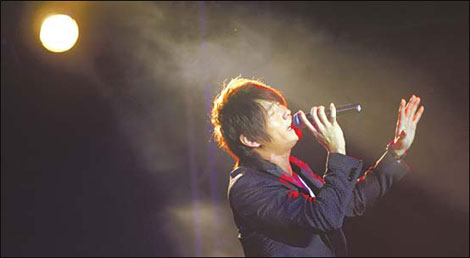Singer invests new gold on revive rusty career
By XU FAN (China Daily)
Updated: 2010-05-20 10:46
 |
Large Medium Small |

Singer/songwriter Huang Ping-Yuan knows how it feels to be adrift.
The veteran performer from Taiwan remembers the time he fell from his windsurfing board, far from shore, and prayed to make it safely back to land.
"I was so far out and there was no wind to push the board back," he said.
Today, his prayers are not so life-and-death but they are still about rescue - this time of his floundering career.
Forty-three-year-old Huang, who is known as the King of the Folk Song, has seen dizzying highs in his long career and relative lows.
Today, he is investing all he has on a comeback, which includes a new album and tour that he hopes will recapture his glory days.
He told METRO that his drama at sea inspired him to chart a new course in his life.
"Sometimes, people should not go straight forward but stop and wait, and then a chance will come," he said.
Huang was speaking after stepping off a glittering stage at Beijing's premiere live commercial performance hall, The Star Live, and, as he spoke about his past and his plans for the future, he looked more like a philosopher than a pop star.
After investing three years and1.6 million yuan on his latest project, the stakes are high.
Huang, who began his career two decades ago, is no stranger to the gossip and entertainment pages of China's newspapers but in recent years, the media's interest has died down.
But the singer, a Pisces who was born on March 17, is hoping his new album and tour - entitled Pisces' Responsibility - will rekindle that interest.
Three years in the making, Huang used his home as security against a loan and spent almost all of his bank savings to collect the 1.6 million yuan he needed.
"It was everything I owned," he said. "Luckily, I have reliable bank records."
The singer, who shot to prominence two decades ago with hits including How you bear me to suffer and Xiao Wei, became a household name in Taiwan, Hong Kong and large cities on the mainland.
"It was a golden time for singers and the record industry," he said.
"During that time, most singers could live very well for a year off the royalties they earned from one successful song."
But Huang's golden time was over after a few years and his income suffered because of the rise of the pirated music industry, which saw the sale of legitimate records slump.
"At the very beginning, I could sell 800,000 albums but after a few years, an album might only sell 50,000 discs," he said.
Industry insiders said pirated music available for free on the Internet mean the prospects are not good for recording artists.
"To be honest, it's really very difficult to earn money just by selling albums," said one insider with Beijing Jishen Cultural Communication Co Ltd, the company marketing Huang's new album.
Huang admitted times are harder than they were at the start of his career, but he is still hoping to turn a profit from his huge investment.
"In addition to album sales, we are cooperating with China Mobile, which is making my songs from the new album available for various uses, such as ring tones," Huang said.
But even with the new string to his bow, Huang admits he is taking a risk and may not earn back the money he has invested.
"I know, but I am not doing it not just for the money," he said.
"I also hope that genuinely good music can be handed down to future generations."
And he also confirmed that part of what he is doing is about regaining his popularity and status in the industry.
Huang is beginning his quest in Beijing.
In addition to promoting his new album, Huang will sing at a massive solo concert in the capital in June.
And his Beijing fans shouted themselves hoarse when Huang appeared on stage in the city on May 11.
At a publicity event to push his new album and concerts, surrounded by photographers, Huang asked two sexy dancers in mini-skirts to sit on his knees to pose for eye-catching photos.
"I will be much hotter in June," he joked when asked if he will show his stomach muscles at the upcoming show.